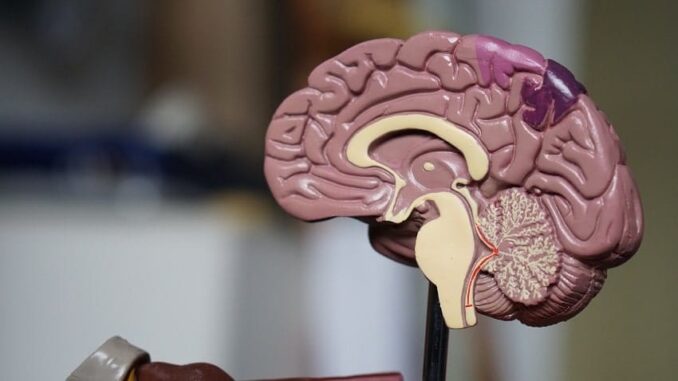
Le called cannabidiol, or CBD, is a recognized neuroprotectant. That Alzheimer’s disease causes the death of neurons, CBD’s interest in relieving its symptoms seems obvious. However, the scientific literature on the subject is still thin and it remains difficult to know its exact effects. Can CBD too Relief of Alzheimer’s symptoms And thereby limit the loss of autonomy sick people ? This is our topic of the day.
CBD: a neuroprotector to support Alzheimer’s patients?

CBD has potentially useful neuroprotective properties against Alzheimer’s disease
among the therapeutic effects of CBD, we count its Effect on neurological diseases. This applies to both neuropsychiatric diseases (autism spectrum disorders, schizophrenia, depression) and Neurodegenerative Diseases thus belong to Alzheimer’s, WOMAN, Huntington’s disease and epilepsy.
So cannabidiol would have neuroprotective properties and the ability to do soimprove cognitive skills its consumers, particularly in connection with Familial forms of Alzheimer’s disease. In some cases, hemp use might as well stimulate neurogenesis (growth of new cells in the brain).
In addition, CBD is absent no side effects major known. This is all the more important as current treatments for Alzheimer’s disease cannot prevent or cure the onset of the disease. They are therefore only more or less effective means slow down or relieve its symptomswith the risk of more or less serious side effects.
The properties of CBD, which are certainly potentially beneficial in the context of Alzheimer’s disease, also offer no hope of treatment at this stage. But you could improve patients’ everyday lives. Before we better understand the hopes raised by the ingestion of cannabidiol and other cannabinoids, let’s first look at what the pathology is and how it manifests itself.
Alzheimer’s disease in brief

Alzheimer’s disease causes memory loss that gets worse over time
Alzheimer’s disease is the most common form of dementia, before Parkinson’s disease (also sometimes treated with CBD). In France, it affects approximately 1.2 million people. This already significant figure is increasing as the proportion of sick people increases with age. As the population ages, Alzheimer’s should affect 2.2 million people in France by 2050. In fact, the disease occurs before the age of 70 less than one in 100 people. After the age of 90, the proportion increases one in three people.
Beyond the numbers, it is the symptoms and the lack of treatment options that pose the greatest difficulties for those affected, the sick and those around them.
Alzheimer’s symptoms
- memory loss.
- Difficulty performing everyday tasks (using numbers, following a recipe, concentrating on an activity).
- Difficulties in orienting oneself in time and space (mixing up dates, seasons, forgetting one’s own location).
- Communication problems, both oral and written.
- Difficulty or inability to remember where you just put an item.
- Difficulty making reasonable assessments of a situation.
- Mood and personality disorders (confusion, depression, anxiety, etc.).
Causes of Alzheimer’s disease
The causes of Alzheimer’s disease are still poorly understood. However, neurons have been found to suffer from two types of damage:
- the amyloid plaquesor senile plaques formed due to excessive accumulation of β-amyloid protein are deposited in the cerebral cortex and prevent normal connection between neurons.
- the neurofibrillary tanglesformed by excessive accumulation of filaments in neurons, lead to the death of neurons at the level of the hippocampus (linked to the proper functioning of memory) and the associative cortex, which links the various functions.
As a direct result, the brain atrophies and causes the above symptoms. The causes of the onset of the disease are relatively unknown. Of genetic factors were highlighted. However, they only affect 5% of cases. L’agegroup the Cardiovascular problemsgroup the sleep disorders and certains environmental factors Finally, (alcohol, drugs, pollution, certain drug treatments) appear to be risk factors.
CBD to Relieve Alzheimer’s Symptoms?
Research on the effects of CBD on Alzheimer’s symptoms is still in its early stages. Still, two axes seem to pique researchers’ interest: the effects of CBD about the disease herself as well on the patients’ quality of life.
Improve cognitive functions
According to an article in the Journal of Alzheimer’sTaking CBD could be linked to Alzheimer’s Improvement in TREM2 and IL-3 levelstwo proteins that play essential roles in clearing waste and beta-amyloid plaques that build up as part of the disease and promote the inflammation and then death of neurons.
Find more quality of life
More broadly, buying CBD can help improve the quality of life for Alzheimer’s sufferers.
- Reduce the anxiety disorders and depressed: CBD promotes the production of serotonin, a substance produced by certain neurons that is active in controlling emotions.
- find one better sleep quality: Taking CBD helps rebalance our internal clock and promotes both falling asleep and sleep quality.
Which CBD product for Alzheimer’s?

Easy to use and available in a variety of strengths, oils seem to be the most convenient CBD product for relieving Alzheimer’s symptoms
There are all kinds of CBD products, more or less concentrated and more or less healthy to take. To deal with the symptoms of Alzheimer’s disease, theCBD oil seems most appropriate. Indeed she is Easy to use (a few drops under the tongue are enough), healthy (no combustion or smoke) and offers visible effects thanks to the numerous concentrations available.
Linked tohemp oil, the CBD also has the advantage of adding the properties of hemp. It contains of course vitamin E (helpful in preventing cognitive decline), fatty acids (which may delay the onset of certain disorders) and omegasuseful against stress and anxiety.


